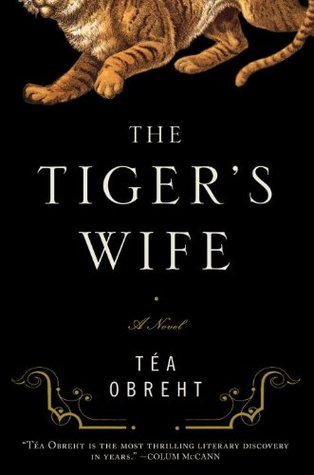The story: based in the Balkans, The Tiger’s Wife is told from the perspective of a young Serbian doctor, Natalia, a character I felt the novel could have done without.
It begins with her receiving news of the death of her grandfather, the news of his death, while earth-shattering, doesn’t come as much of a surprise to Natalia as she’d known for a while that he had cancer. It is rather the circumstances of his death that the novel follows. It courses through the history of the fictional village of Galina, where her grandfather lived as a young boy. We follow the narrative through to the advance of the escapee tiger to his village. He happens to know what a tiger is because of the pictures he’d seen in The Jungle Book – a novel that remains about his person for the rest of his life.
When sojourning from tales of the grandfather, Obreht tells us the background stories of the bear-man (his name alludes me, it isn’t important anyway), the butcher aka pseudo-musician aka wife batterer aka arschloch, the deaf-mute Muslim wife of arschloch, the alchemist and a few other unimportant characters.
You learn more of the grandfather’s life and how much he influenced Natalia with their ritual visits to the zoo amongst other things. With all the flashbacks, you also get a glimpse of Natalia’s current day activites; stuck on a farmland where a bunch of superstitious migrants are trying to uncover the body of a long-dead cousin whom they believe has placed a curse on them and other such niceties. Natalia’s life isn’t as interesting as her grandfathers. It really isn’t.
I’m a bit bored of relating the story back to you so I’ll go straight onto my opinion on the book…
Rewa’s take on things: I was really looking forward to reading this but I found my brain taking regular vacay’s. Normally I absolutely love novels that are entrenched in different cultures/eras (Janice Lee’s The Piano Teacher for example) that are beyond my living sphere but this did nothing for me. I wasn’t any more curious about sampling rakija than I was about eating cheese (one of the most disgusting accompaniments on earth – yuk!).
Natalia stirred no sentiments in me whatsoever – I found her bland and uninspiring. The child inside me was disappointed to find that she didn’t meet Gavo at the crossroads, I was hoping that she’s meet her demise then *evil laughter* or at least prove the deathless man’s existence. Gavo was the most fascinating character by far. I’d much rather have read about the grandfather’s life and encounters with Gavo through his own narative and not through Natalia’s. I also liked the deaf, mute Tiger’s Wife. She seemed to possess an inner strength that her sadomasochistic husband could never break. Why the alchemist poisoned her, I’ll never know and he deserved more than a quick hanging at the gallows. What a douche.
The story switching irritated me. I was so keen to move onto her grandfather’s dalliances with Gavo that I was frustrated to have to be held up by narratives on the Bear, the wife batterer, the Alchemist and other such irreleavants!
What I found especially poignant about the novel was the behaviour of the animals at the zoo during the war. Foxes eating their cubs, tigers eating their own body parts, ducks cracking open their own eggs to prevent the ducklings from entering this ugly world. It was very sad. But as my boyfriend says, I have a penchant for anything furry with four legs and big eyes J.
I also liked the following of the tiger’s journey from the destroyed zoo to the comfort of the Tiger’s Wife, I felt that Obreht was trying to link this to the state of her country during the war but I can’t quite make the connection.
Oh and by the way, the title, Tiger’s Wife, is allocated to the deaf-mute girl, the superstitious villagers thought she was indulging in bestiality because she and the tiger shared a bond.
On the whole, I got to learn a bit more about the Balkan wars and folklore (on which Gavo and a few other characters are based) but beyond that, I’d rather have spent the evening sampling cheese!

